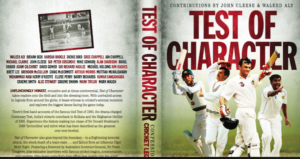A fascinating book that goes beyond runs and wickets
By Kersi Meher-Homji
Test of Character ”“ Confessions of Cricket Legends by Jeremy Wilshire, Echo Publishing, Australia, $34.95, 384 pages.
Many books on cricket are written these days, mostly by retired Test greats ”“ often ghosted. But Test of Character is different. Honestly written, evocative and at times controversial, this book takes readers on the field of play and in the dressing rooms to reveal stories seldom heard before.
The Foreword is written by Australia’s Governor General Sir Peter Cosgrove. Then there are interviews by cricketing legends from all over the world: Alan Davidson, Ian and Greg Chappell, Bishan Bedi, Barry Richards, Richard Hadlee, Rahul Dravid, Muttiah Muralidaran, Kumar Sangakkara, Michael Clarke, Adam Gilchrist, Mark Taylor, Mark Waugh, David Gower, Brendon McCullum and Brett Lee among others.
Also interviewed are an Afghani cricketer Mohammad Nabi and a female Test all-rounder Ellyse Perry. Not ignored are avid cricket fans, television personality Waleed Aly and English comic actor John Cleese.
To add to the comic touch are radio commentators Harsha Bhogle and Kerry O’Keeffe as also cricket’s whimsical umpire ”˜Dicky’ Bird.
India’s comeback in the famous Kolkata Test of 2001 when VVS Laxman and Rahul Dravid added 376 runs to win the match is revealed in 3-D effect as also the drama-charged Centenary Ashes Test among other international thrillers.
The interviewees reveal something new. Davidson remembers the Brisbane tied Test of 1961 with passion. On the last day of that epic match, West Indies express fast bowler Wes Hall had blisters on his feet. “He got scissors, cut out a blister the size of a coffee cup, put sticking plaster across and continued bowling.”
We see the other side of Ian Chappell who author Jeremy Wilshire describes as sugar-free skipper. “His [Ian Chappell’s] hard-nosed persona belies a touching empathy, for he has helped several players who have fallen on hard times and he is a passionate advocate for the better treatment of asylum seekers [in Australia].”
I found his interview with Indian spin legend Bishan Bedi the most revealing. This is how author Wilshire describes Bedi, “Gregarious and provocative with a contagious love for life, this Godfather of Subcontinental spin boasts a bowling action of smooth caramel and an opinion of fiery vindaloo.” He quotes former England captain Tony Lewis who opines Bedi thus: “A clockmaker would have been proud to set Bedi in motion ”“ a mechanism finely balanced, cogs rolling silently and hands sweeping in smooth arcs across the face.”
According to Bedi, Twenty20 and IPL are destroying the character of cricket. He says, “I can’t think of any greater rubbish being sold at such a high price… The whole thing stinks of multimillion-dollar corruption.
“A game of golf is 18 holes, correct? Can you imagine a game being finished in three or four holes? Or a game of football ”“ I can’t imagine anyone toying with the idea of finishing it in five minutes!”
Equally fascinating is the interview of Rahul Dravid, the only cricketer to have scored a century in each of the ten Test playing nations. A patron of LBW Trust ( Learning for a Better World which gives hope and opportunity to thousands of young people in developing cricket playing countries), he is also an ambassador for the Children’s movement for Civic Awareness.
On the 2001 Kolkata Test in which he added 376 runs with VVS Laxman, he says, “VVS’s 281 was as though he was batting on another planet... I always enjoyed batting with him and we’re good friends off the field.”
Like Bedi, Dravid is against T20 cricket. He has urged young players not to sell themselves short with T20 obsession and adds that modern sport is at serious risk of losing its moral compass and tabled four issues that need legal intervention: doping, deliberate underperformance, involvement in the betting industry and age fraud.
Rahul’s childhood hero was Sunil Gavaskar. He remembers his Test debut against England at Lord’s (where he scored 95) as the most exciting five days of his life. “It was a dream come true”, adds Rahul.
He admits that Muttiah Muralidaran was the bowler he had most trouble with, “especially when I was not picking his doosra.” He also admired Australian fast bowler Glenn McGrath for his sheer consistency and aggression.
According to Adam Gilchrist, “Dharmasala, right up in northern India in the foothills of the Himalayas, is easily the most picturesque ground I have been to… It’s spectacular ”“ and a beautiful pitch to bat on.”
This fascinating book goes beyond runs and wickets and reaches further than the boundary line. It features a frightening terrorist attack, the tragic death of a team-mate and fallout from an infamous Tiger Moth flight.
A portion of the sales from this book will support the Learning for a Better World (LBW) Charity Trust.
Short URL: https://indiandownunder.com.au/?p=8185

